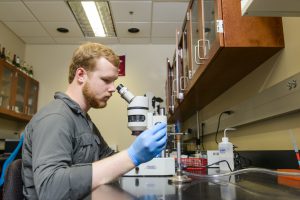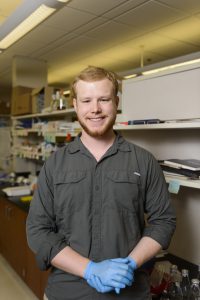
TUSCALOOSA, Ala. — A senior microbiology major at The University of Alabama has been awarded a summer fellowship by the Parkinson’s Disease Foundation and American Parkinson Disease Association.
Samuel Stanley, a graduate of Oakwood High School in Dayton, Ohio, began the fellowship this month at UA, where he has worked as an undergraduate researcher for Dr. Kimberlee Caldwell, UA professor of biological sciences, since his freshman year.
Stanley investigates potential causes for contributors of dopamine neuron degeneration, a characteristic of Parkinson’s Disease.
The PDF award is part of a $60,000 joint fellowship program with the APDA for early career researchers across the world. Stanley will receive $4,000 over 10 weeks to continue his research at UA. He’s one of 12 undergraduate or graduate researchers to receive the fellowship.
“I’m honored to receive this fellowship and excited to continue our work in the lab this summer,” Stanley said. “It’s been a tremendous experience, and working in the Caldwell Lab has made college a much more well-rounded experience.”

Stanley’s research focuses primarily on the microorganisms that live inside the human body and what implications they have on our health.
In his project, “Investigation of Dopamine Neuron Degeneration as a Consequence of Microbiome-Derived Bacteria,” Stanley is studying the bacterial strains relevant to the microbiome – the collection of bacteria in our bodies.
“This project deals with the core notion that bacteria within our intestinal tract impact our health, and more important, how they might contribute to the onset of Parkinson’s disease,” Stanley said. “We’re doing this by taking some of those bacteria that have been associated with Parkinson’s and checking for changes in neuron health using a common soil nematode and seeing if it has changes in dopamine neurons when exposed to gut microbes.”
The PDF estimates between 7 and 10 million people worldwide suffer from Parkinson’s Disease, and approximately 60,000 Americans are diagnosed each year. When a Parkinson’s patient is exhibiting symptoms of the disease, like involuntary shakes, they’ve lost up to 80 percent of the dopamine neurons in their bodies, Stanley said.
“The microbiome twist is relatively novel and a good starting point to reconfirm that,” Stanley said. “We work with these nematodes every day, using a variety of strains to study their dopamine neurons via UV illumination in controlled conditions. By monitoring the number of dead and dying neurons in the nematode’s head, we can actually evaluate if a particular bacteria contributes to loss of dopamine neuron health and, potentially, what role that bacteria has in the onset of human Parkinson’s disease.”
Contact
David Miller, UA media relations, 205/348-0825, dcmiller2@ur.ua.edu
Source
Dr. Kimberlee Caldwell, professor, biological sciences, 205/348-4021, kcaldwel@bama.ua.edu; Samuel Stanley, microbiology major, spstanley@crimson@ua.edu
